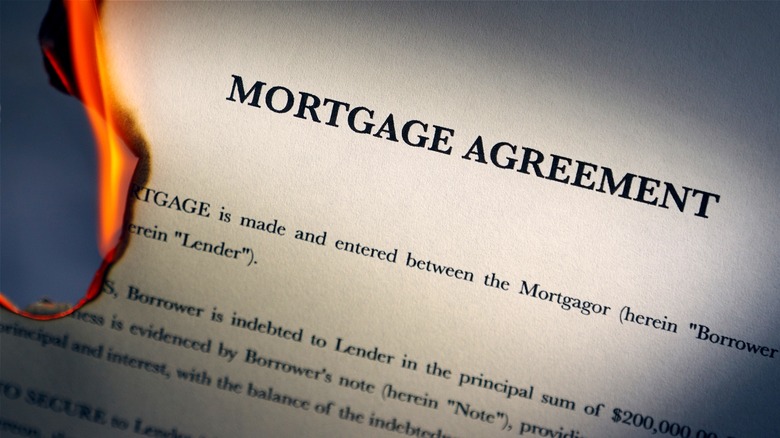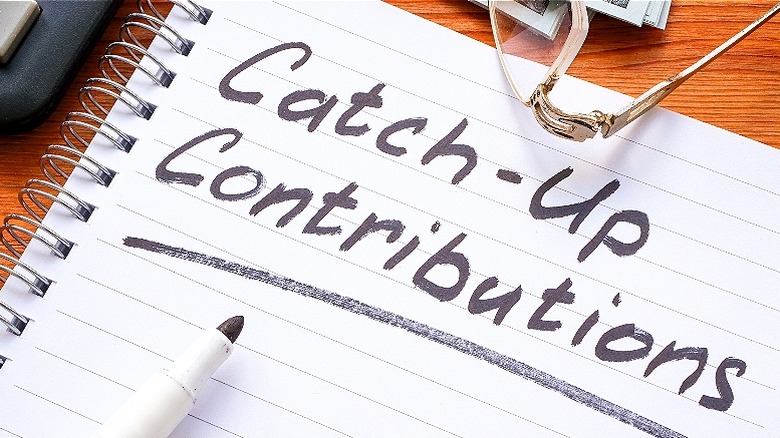At This Age, Paying Off Your Mortgage Should Be Your Biggest Money Goal
Frequent Money Digest readers may recall that in the past, we've cautioned against making extra mortgage payments, never mind paying the balance off in full. To be clear, the time period in which your mortgage originated will have a great impact on this financial decision. For example, in the midst of the COVID pandemic, interest rates on 30-year fixed-rate mortgages dipped below 3% in 2021, which is incredibly low. That's compared to current 30-year mortgage rates, which for the week ending August 2024, fell below 6.5% for the first time in 16 months, per Bankrate.
Obviously, homeowners holding a sub-3% mortgage will be much less inclined to pay it off early than borrowers paying at ~6.5% interest. Besides taking into account your mortgage's interest rate, though, also consider your other debts and investment goals. For instance, it's silly to rush to pay your house off if you have significant credit card debt with much higher interest charges (very likely in excess of 20%). Similarly, you shouldn't make extra mortgage payments at the expense of not taking advantage of matching IRA or 401(k) contributions from your employer.
However, aside from these already mentioned factors, have you ever considered what impact your age has on the goal of paying off your mortgage? Generally speaking, starting retirement debt-free can provide reduced living expenses and a sense of financial security. With that in mind, age 50 and up is the time to get serious about paying off your mortgage; though, as always, certain exceptions exist.
You'll have peace of mind and save interest fees, too
Once you reach age 50, it's likely the prospect of retirement will loom considerably larger than in your earlier carefree years. As such, you'll probably give thought to trimming your living expenses as your peak earnings begin to fade. Odds are your mortgage payment is your largest monthly expense, so eliminating it by aggressively paying off your home will make it far easier to survive on a fixed income, or less income than when you were employed.
Also, paying off your mortgage early can save a surprising amount in interest charges. Let's take a 30-year fixed-rate mortgage for $400,000 with a rate of 6% as an example. If a homeowner pays the loan off 10 years early — i.e., in 20 years instead of 30 years — the savings is $71,769.91 in interest alone. Better still, that savings is equivalent to an investment that's both risk-free and tax-free.
Obviously, paying off your mortgage earlier than the original terms will require coming up with some extra cash, which might involve some strict budgeting (by the way, what exactly is a budget?) and reduced spending on non-necessities. Once the extra cash is secure, you can make one extra payment per year, send in additional principal with each monthly payment, or make lump-sum extra payments toward the principal using windfalls, like work bonuses or income tax refunds. In all likelihood, your payoff strategy will employ several of these techniques simultaneously.
It's not the right move for everyone age 50 or older
As with most financial advice, there's seldom a one-size-fits-all approach when it comes to paying off a mortgage. For instance, if you've been neglecting to contribute sufficiently toward a retirement plan, doing so should be top priority rather than aggressively paying off your home loan. Also, keep in mind that after age 50, you're permitted to contribute more than the typical maximum for 401(k) plans and other retirement vehicles in what's called catch-up contributions. If you're under-invested, definitely take advantage of this opportunity.
On the other hand, you definitely don't want to take money out of a retirement account to pay your house off early, no matter how significant your account balance is. That's because most withdrawals from a retirement account made before you turn 59 ½ years old are taxed as regular income. Paying income tax on the funds used to satisfy your home loan will most definitely erode the benefits of doing so — and then some.
Once again, make sure that all higher-interest debts are already paid off and you have a sufficient emergency fund before committing all your financial resources to paying off your house, even at age 50 or older. There's no point in carrying expensive credit card debt or being cash-poor just for the sake of a paid-off dwelling. Finally, it also may be possible to sell your existing home to satisfy the mortgage and downsize into a less-expensive place, too, all with a nice chunk of cash to spare. As a bonus of downsizing, the maintenance and upkeep requirements will be less, which will give you more time and money to enjoy the retirement you've worked so hard for.


